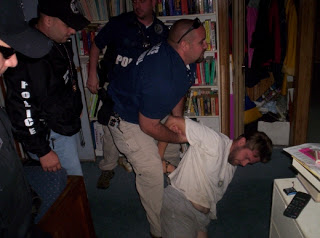To The Gulag, But For The Grace Of The State, Go I

A “Crime” is invented:
New Hampshire anti-tax activist Russell Kanning is “arrested” — the common euphemism for an officially sanctioned assault — for the supposed crime of handing literature to employees of the criminal syndicate called the Internal Revenue Service. It’s not necessary to commit an actual crime in order to be treated this way.To Brooklyn resident Matthew Jones goes the distinction of proving something long suspected by students of the institutionalized affliction called government: If they want to, the State’s armed enforcers can find a “legal” excuse for taking away one’s freedom even if the individual is doing absolutely nothing.
At around 2:00 am the morning of June 12, 2004, Mr. Jones was standing and chatting amicably with a few other people on the corner of Manhattan’s 42nd Street and Seventh Avenue. None of them was doing anything to injure or even annoy another living soul – or, for that matter, to disturb public order. Reasonable people that they were, Jones and his friends would yield to the occasional pedestrian who needed to get by, but owing to the hour the sidewalks weren’t as congested as they would be during business hours.
Into this unremarkable scene wandered a badge-wearing pest who decided to arrest the inoffensive Mr. Jones on a “disorderly conduct” charge.
One might reasonably ask: “What manner of `disorderly conduct’ can someone engage in standing still?”
According to the arresting police officer, Jones was “impeding other pedestrians,” reports the New York Times.
So a gun was brandished (every contact with a police officer involves the threat, however subliminal, of lethal violence) and handcuffs were applied to the wrists of the astonished and disgusted Mr. Jones. In familiar fashion, Jones was slapped with the additional charge of “resisting arrest” for “flailing his arms” as he understandably tried to wrench himself from the grasp of the dishonest, demented tax-feeder.
According to the account from Officer Momen Attia, Jones “refused to move when asked,” and then “tried to run away” when threatened with arrest.
Think for just a second: If the problem was that Jones wasn’t moving, why did Officer Attia insist on taking him into custody once Jones tried to “run away”? And why was it supposedly necessary to place handcuffs on Jones and haul him to jail, rather than writing a citation – assuming (as reasonable people would not) that merely standing still on a sidewalk constitutes some kind of infraction?
The answer, of course, is that Mr. Attia, like many – perhaps most – of the criminal class we refer to as “public servants” is prepared to act on the totalitarian assumption, “That which is not expressly permitted is forbidden.” From that perspective, all of us who don’t belong to the governing caste are lawbreakers subject to State-authorized violence at the whim of Leviathan’s armed enforcers. And let it not be forgotten that each and all of us can be arrested at any time, because it is literally impossible not to violate some enactment – however pointless, arbitrary, or obscure – referred to as a “law.”
Christians understand that our hope for salvation resides in God’s grace, not in obedience to the Law. As Paul wrote in his epistle to the Romans, “… no one will be declared righteous in His sight by observing the law; rather, through the law we become conscious of sin.” (Romans 3:20)
Statism rests on a diabolical mimickry of that principle: The purpose of what Statists refer to as the “law” is not to protect persons and property, but rather to leave the governed in a state of perpetual insecurity regarding their behavior, and to render them perpetually at the mercy of the State’s enforcers.
It can happen to anyone, for no defensible reason: Denver Real Estate agent Alberto Romero (left, with his family) died after a Taser attack; Romero attracted police attention by acting strangely following what appeared to be some kind of seizure.
The subject’s relationship to the State could be summarized in a transposition of a familiar idiom: “To the gulag, but for the grace of the State, go I.”
Don’t think for a picosecond that those who operate the instrumentality of coercion aren’t aware of this reality, and eager to exploit it when there is power or profit to be gained from doing so.
In a series of articles for Slate, Professor Tim Wu of Columbia University Law School examined the ways in which “American law is under-enforced” — meaning that a tacit agreement exists between the government and the people not to prosecute every conceivable offense. This applies to “morality” laws dealing with such things as gambling, obscenity, and polygamy, some elements of narcotics prohibition and – most famously – illegal immigration. But the principle applies to myriad other “laws,” ordinances, enactments, codes, and regulations that we are supposedly obliged to obey.
“At the federal prosecutor’s office in the Southern District of New York, the staff, over beer and pretzels, used to play a darkly humorous game,” writes the professor, who (I’m required to note as a fan of 1970s album-oriented rock) could be addressed as Dr. Wu. “Junior and senior prosecutors would sit around, and someone would name a random celebrity – say, Mother Theresa [sic] or John Lennon. It would then be up to the junior prosecutors to figure out a plausible crime for which to indict him or her. Those crimes were not usually rape, murder, or other crimes you’d see on Law & Order, but rather the incredibly broad yet obscure crimes that populate the U.S. Code like a kind of jurisprudential minefield: Crimes like `false statements’ (a felony, up to five years), `obstructing the mails’ (five years), or `false pretenses on the high seas’ (also five years). The trick and the skill lay in finding the more obscure offenses that fit the character of the celebrity and carried the toughest sentences. The result, however, was inevitable: `prison time.’”
The point of this supposedly whimsical little drinking game, notes Wu, is that “Full enforcement of every law on the books would put all of us in prison for crimes such as `injuring a mail bag.’”
Portland resident Frank Waterhouse, the victim of the police attack captured in this video, was Tasered and shot with a beanbag round while videotaping this illegal warrantless search. The police justified this assault by protested that Waterhouse refused an order to drop the camera, “which could be used as a weapon.”
It has to be understood that this is not merely a perverse little prosecutorial past-time, nor is it just a useful little object lesson. The “game” described by Wu is nothing less than a form of casual apprenticeship: Remember, it’s designed to teach junior prosecutors to rummage around in the most arcane recesses of the criminal code to find some way to put innocent people in prison.
One might ask: Are there similar “games” and practices followed by prosecutors elsewhere in the United States? Well, where do pestilential specimens like Michael Nifong and Andy Thomas come from, if not from a culture in which “games” and other training methods of this sort are common?
We can see the success of such indoctrination in the fact that the United States of America now has the largest prison population of any society in history, with seven million of our fellow Americans either behind bars or on probation or parole.
In a larger sense, however, given the depraved appetite of prosecutors and police to assert their supposed authority, and the perverse ingenuity they have for transmuting peaceful, inoffensive behavior (such as standing still on a public sidewalk) into “crimes,” all of us could be considered part of the parolee population, subject to officially sanctioned violence and imprisonment at the whim of our supposed protectors.
A Personal Note
Please forgive me if my posts become shorter, and my schedule becomes a bit erratic. Korrin is once again in the hospital (as soon as I’m finished, I’m going to visit her). I deeply appreciate the kindness you have shown toward her and to my family.
Content retrieved from: http://freedominourtime.blogspot.com/2007/10/to-gulag-but-for-grace-of-state-go-i.html.




























